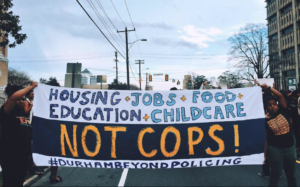 This article was written for L’Anticapitaliste, the weekly newspaper of the New Anticapitalist Party (NPA) of France.
This article was written for L’Anticapitaliste, the weekly newspaper of the New Anticapitalist Party (NPA) of France.
George Floyd, the black man whose murder by white police officer set off weeks of national protests against police brutality and racism, was buried on June 9 in his hometown of Houston. Still demonstrations continued in myriad forms, from rallies and marches to car caravans and protest parades of hundreds of bicyclists. Local governments have now restrained the police who attacked earlier demonstrations so violently. In Seattle, after the mayor closed a local police station and removed police from the Capitol Hill neighborhood, local radicals and residents declared it an autonomous zone that some have compared to the Paris Commune of 1871. President Donald Trump, of course, has called upon the mayor to take back the city.
Polls show that 80 percent of Americans support the protests that took place in 700 cities in all 50 states and which have fostered in virtually every institution, from public agencies to private businesses, a national discussion about racism.
The entire country is involved in debates over the role of the police and the use of the National Guard in violently suppressing the demonstrations, as well as over Trump’s use of the Guard to attack peaceful protestors at the White House and his threat to use the Army to crush the movement. Both the secretary of defense and the top American general broke with Trump on those issues. Many retired military leaders have spoke out against Trump’s threat to use the Army. Political leaders, mostly Democrats but also some Republicans, criticized Trump’s posturing as a dictator.
There is also a deeper discussion over demands to defund the police. The demand to defund the police comes from the left movement that calls for defunding, disarming, and abolishing the police and prisons. While a majority of the Minneapolis city council says that it will abolish its current police force and create a new public safety organization, almost everywhere else the slogan defund is interpreted by politicians, the press, and many in the movement to mean cuts in the police budget and the reallocation of funds to mental health, drug programs, and other social services. The Democratic Socialists of America have launched a national campaign to defund the police. And in Congress the Democratic Party has introduced legislation for police reform.
Also being debated is the role of police unions that defend police officers who are accused of racist behavior and violent acts. The police unions, many of which support Trump, also often take conservative positions on criminal justice issues, such as opposing parole. Some on the left want the AFL-CIO, the national labor federation, to expel the police unions, but the AFl-CIO has called for their reform.
Other institutions have begun to take steps on questions of race. NASCAR, the corporation that organizes car races, where nearly all of the drivers and 80 percent of fans are white, has banned the Confederate flag, the flag of the southern slave states in the Civil War, which has often been flown by drivers and fans. Top generals in the U.S. Army expressed a willingness to rename ten U.S. military bases in the South that now bear the names of Confederate generals. There is also renewed debate over removing statues of Confederate generals, some in Southern states and others in the national Capitol building.
Meanwhile, in the midst of the national reopening of the economy, the coronavirus surges once again in the southern Sunbelt from Florida to Arizona as 22 of 50 states have rising case numbers. And 40 million workers remain unemployed, as Trump is about to restart his presidential campaign with mass rallies, further endangering public health. At present only 38 percent of voters approve of Trump’s while 57 percent disapprove; and the president has fallen 10 points behind Joseph Biden, the Democratic Party candidate. At the moment, Trump seems headed for defeat.


Leave a Reply